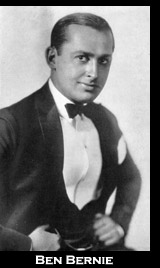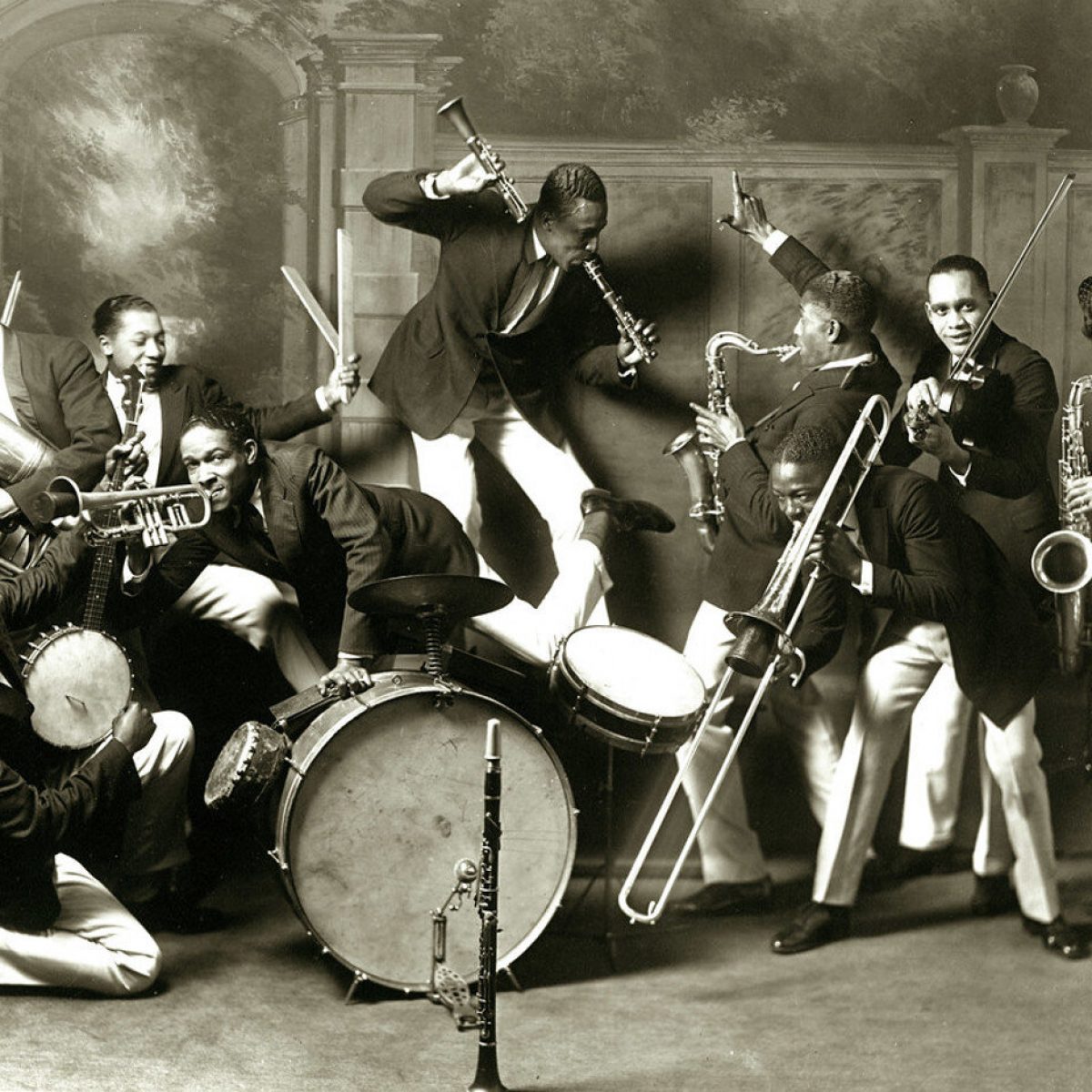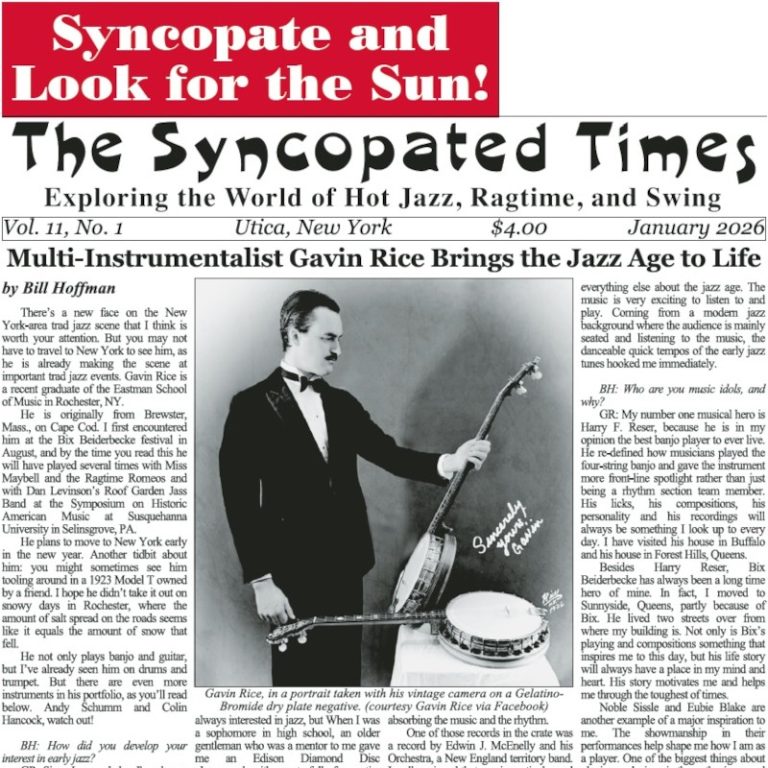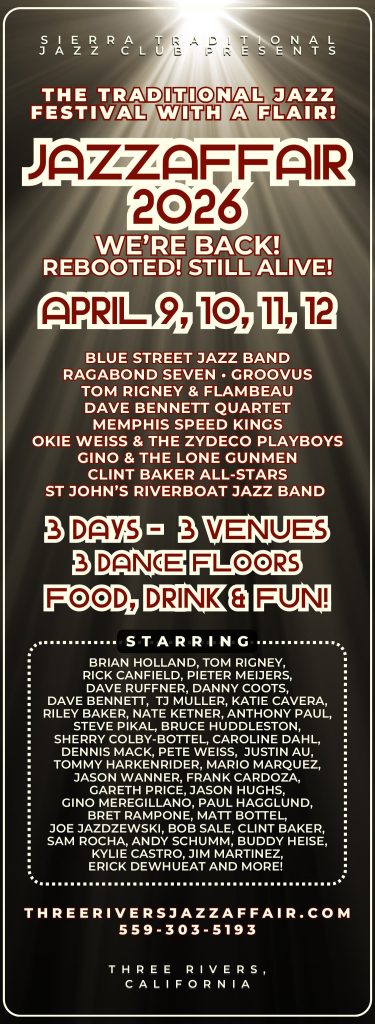The film clips on this page are the result of a cross between current entertainment and new technology (in 1925, that is). A decade before the Old Maestro would say ‘Yowsah, Yowsah’ and ‘Au revoir, pleasant dreams’ on the radio, Ben Bernie, impressed with  Paul Whiteman‘s approach to music, formed an orchestra using players from a band led by Don Juelle. Paul Whiteman‘s approach to music, formed an orchestra using players from a band led by Don Juelle.
Originally scheduled for a limited engagement, the orchestra played exclusively at the Roosevelt Hotel in New York from 1923 to 1929. Ben Bernie and His Orchestra recorded on the Vocalion label in 1923 and, in 1925, on the Brunswick label.
DeForest directed the Phonofilm of Ben Bernie and All The Lads in late 1924 or early 1925 (this film has been dated as early as 1922, but some of the songs filmed were not published until later). The orchestra included Jack Pettis on tenor sax (and doubling soprano) and Oscar Levant on piano. The first clip is described as a medley of songs by George Gershwin and Vincent Youmans. However, the songs played in this medley are: “Rose Marie” (1924 – Otto Harbach – Oscar Hammerstein II – Rudolf Friml) / “Oh, Lady Be Good” (1924 – George and Ira Gershwin) / “Tell Her In The Springtime” (1924 – Irving Berlin) / “Rose Marie (reprise)” / “Indian Love Call” (1924 – Otto Harbach – Oscar Hammerstein II – Rudolf Friml) / “Tea For Two” (1924 – Vincient Youmans, Irving Caesar) / Fascinatin’ Rhythm (1924 – George and Ira Gershwin). Some of these songs were recorded by Ben Bernie and His Orchestra on Vocalion in late 1924/early 1925. The songs recorded on the other three clips are “Craving” (1925 – Ben Bernie, Philip Charig, Kenneth Casey, William Lewis), “Titina” (1925 – Elisha Ronn, Marcel Bertal, Louis Maubon, Leo Daniderff – This melody comes from the french music-hall or café-concert of the early 1900s. The full name of the song is “Je cherche après Titine” (I’m looking for Titine). The song was used with special lyrics in the 1936 Charlie Chaplin movie “Modern Times”). “Sweet Georgia Brown” (1925 – Ben Bernie, Maceo Pinkard and Kenneth Casey). These songs were recorded by the orchestra on Vocalion in early 1925. On the Sweet Georgia Brown clip, Jack Pettis performs the first jazz solo recorded on sound film. -by Dennis Pereyra |
 |
||
 Windows Media clip (20.1 MB) Quicktime clip (15.2 MB) |
||
 |
||
 Windows Media clip (12.9 MB) Quicktime clip (9.9 MB) |
||
 |
||
 Windows Media clip (13.4 MB) Quicktime clip (9.4 MB) |
||
 |
||
 Windows Media clip (13.9 MB) Quicktime clip (16.4 MB) |
||
 |
||
Redhotjazz.com was a pioneering website during the "Information wants to be Free" era of the 1990s. In that spirit we are recovering the lost data from the now defunct site and sharing it with you.
Most of the music in the archive is in the form of MP3s hosted on Archive.org or the French servers of Jazz-on-line.com where this music is all in the public domain.
Files unavailable from those sources we host ourselves. They were made from original 78 RPM records in the hands of private collectors in the 1990s who contributed to the original redhotjazz.com. They were hosted as .ra files originally and we have converted them into the more modern MP3 format. They are of inferior quality to what is available commercially and are intended for reference purposes only. In some cases a Real Audio (.ra) file from Archive.org will download. Don't be scared! Those files will play in many music programs, but not Windows Media Player.


 At the same time, Lee DeForest invented a sound-on-film process for talking pictures. The Deforest Phonofilm Corporation was formed in November 1922. Several years before the release of the Warner Brothers/Vitaphone film “The Jazz Singer”, considered by many people as the beginning of sound films, DeForest produced a series of Phonofilms and sought out theaters to distribute them. However, due to the loyalty of theaters to the major film producers and the expense of wiring a theater for sound, his attempts only met with limited success.
At the same time, Lee DeForest invented a sound-on-film process for talking pictures. The Deforest Phonofilm Corporation was formed in November 1922. Several years before the release of the Warner Brothers/Vitaphone film “The Jazz Singer”, considered by many people as the beginning of sound films, DeForest produced a series of Phonofilms and sought out theaters to distribute them. However, due to the loyalty of theaters to the major film producers and the expense of wiring a theater for sound, his attempts only met with limited success.



